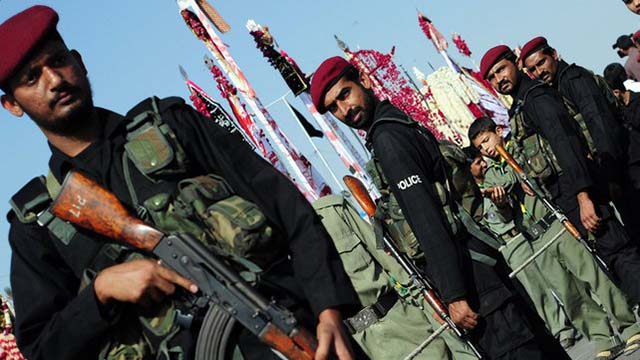Sectarianism holds strong sway in Pakistan and the minority ethnic groups suffer severe violence. According to reports, a suicide attacker blew himself up on October 23 in a Muharram procession in the Jacobabad district in Sindh, killing 24 people, mostly children. More than 40 people were injured in the explosion.
It came as a day earlier, 11 people were killed and a dozen others were wounded in a similar attack outside a Shia mosque in Balochistan’s Bolan district.
It is said that the Shia mourning procession was on its way back in the city’s Lashari Mohalla neighborhood when it was targeted. “There were pieces of human flesh lying everywhere at the site,” a Pakistani reporter is quoted as saying. Reportedly, a power breakdown that followed made it worse for the survivors. The nearby government hospital was understaffed that day, and some of the wounded died because they could not be given immediate medical care.
It was reported that Jundullah, a splinter group of Tehrik-e-Taliban Pakistan (TTP) that declared allegiance to the Islamic State (IS) group last year, has claimed the responsibility for the attack. However, Sindh Home Minister Suhail Anwar Siyal said that Lashkar-e-Jhangvi (LeJ) has claimed responsibility.
Lack of religious tolerance has triggered violence and hatred in Pakistan. The ethnic minority groups are unable to celebrate formal ceremonies or religious rituals in a secure environment. The Shia minority groups suffer the bulk of the violence and no Muharram ceremony passes without human casualties – especially in major cities.
In short, the active presence of multi-extremist groups has narrowed the air for religious minorities.
It is self-explanatory that Madrasahs are used as a safe haven for religious extremists – who brainwash children and organize terrorist attacks.
The political parties, who operate under the name of religion, employ a number of teenagers from the poverty-stricken families and train them as a vehicle for their political interests. Hence, it is widely believed that Madrasahs are a hotbed for fundamental ideology and sectarianism.
The fundamental groups have constantly sparked sectarianism in different parts of Pakistan, which has created a great challenge for the government. Currently, tackling sectarian violence and extending religious tolerance is the biggest challenge for the Pakistan government. Since the minority groups have changed into sacrificial lambs and lose their lives flagrantly, the wall of mistrust has reached high among the nations. Human rights are violated to a large extent under the watch of government officials. One’s blood is shed in a mosque, in a mourning procession, in a church, on the street, in a supermarket, etc. for following a certain belief. The narcissistic mindsets of the extremist groups are the very reason behind sectarianism.
The emergence of the Islamic State (IS) groups will further fan religious tensions. It is believed that members of some warring parties have also pledged allegiance to the self-styled IS group – which paves the way for its stronger foothold. Since the main reason behind IS’s existence is to usher in religious wars in Islamic countries, their emergence, without disputes, will deteriorate the security situation in any countries, including Pakistan.
The religious phobia is widely spread across the Islamic countries, especially in Afghanistan, Pakistan, Iraq and Syria. The Islamic radicals carry out deadly acts of terror which lead to the death of many Muslims including women and children. Their dogmatic ideology considers others heretic; therefore, they compete in murdering innocent humans without an iota of mercy. Hence, the religious hardliners shake hands with none. This is, indeed, a great tragedy in Islamic world.
History shows that violence and bloodshed on the basis of religious beliefs will only lead to casualties and ravages. Shedding one’s blood for a particular ideology will foment trouble in a community rather than ending the issue. Crusading against one’s religious convictions has shown its ugliest face throughout the history. Historical bloodbath over religious beliefs left heavy casualties behind without a positive change. No doubt, the more a conflict continues the more it will lead to destructions.
To counter terrorism and curb religious tensions, it would be the best way for Pakistan to root out the hotbeds of fundamental ideologies and shut the doors of those Madrasahs who preach hatred– which spew forth venom and hatred for perishing innocent human beings. In another item, the government should root out the main factors of terrorism rather than battling against the sub-braches. The activities of educational centers and text books have to be monitored carefully and reformed effectively.
The Islamic countries have to learn from the checkered history of human societies and value the rights and dignity of one another. It is aptly stated in the preamble of Universal Declaration of Human Rights as, “…Contempt for human rights have resulted in barbarous acts which have outraged the conscience of mankind, and the advent of a world in which human beings shall enjoy freedom of speech and belief and freedom from fear and want has been proclaimed as the highest aspiration of the common people”.
Considering one’s rights and dignity on the grounds of race, color, beliefs, etc. will spark tensions among the nations and will inflict incurable wounds in the hearts of human societies.

